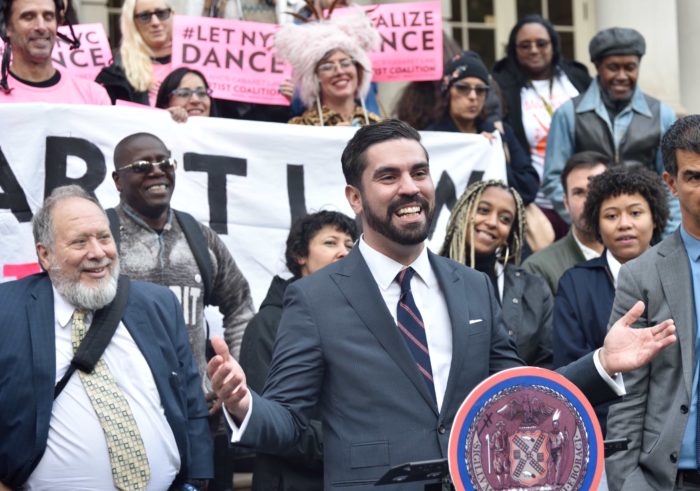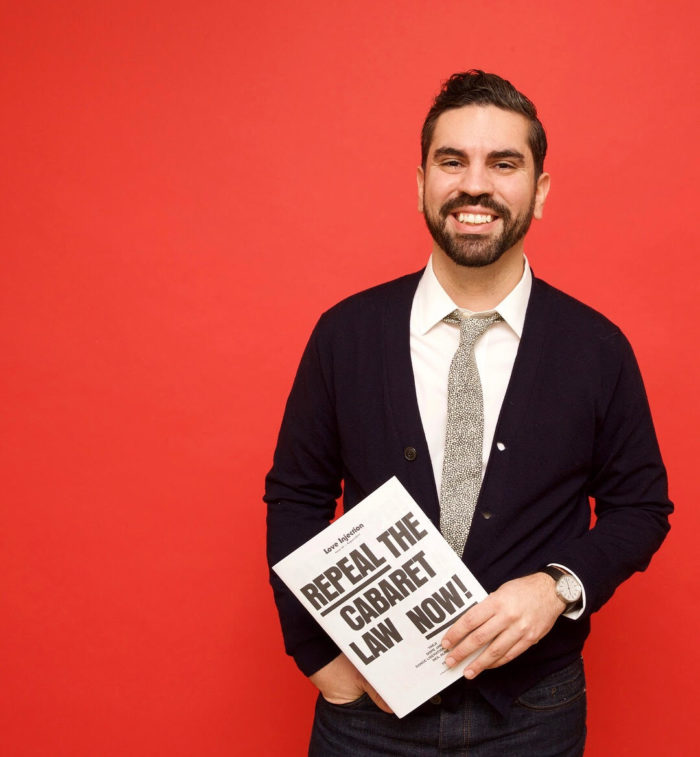A ban on plastic straws in restaurants, limits on after-work emails, the creation of a “Night Mayor,” and the deregulation of dancing in clubs. Behind all these legislative ideas making headlines in the city recently is one elected official: Rafael Espinal, the 34-year-old, Dominican-American City Council member who represents Brooklyn’s 37th District.
What drives the young legislator and all of these diverse proposals? Espinal is a progressive Democrat, but his positions can be anything but predictably liberal. He opposed Mayor de Blasio’s proposed ban on carriage horses, for example, and has introduced legislation to help preserve neighborhood gas stations. The deciding factor for Espinal, whose district ranges from rapidly gentrifying Bushwick to struggling Brownsville and East New York, usually comes down to jobs.
“He’s not trying to save the world, but he’s trying to save Brooklyn,” says City Council Member Alan Maisel, who represents the nearby 46th District. Maisel describes his younger colleague as “an outstanding representative of his generation. He doesn’t take himself too seriously, but he works very hard.”

Espinal celebrating the repeal of the city’s 91-year-old Cabaret Law, which prohibited nightclubs from allowing dancing without a special license (Photo by John McCarten/NYC Council)
Espinal revels in his freethinking approach. Unlike many of his council colleagues, he has not joined the Progressive Caucus and was the first council member to endorse Bernie Sanders (and for a time, the only one). “I enjoy being independent,” he told The Bridge. “It gives me more freedom and time to focus on the issues I think matter most, while serving to assist my colleagues.”
Espinal has emerged a high-profile politician since his unlikely ascension, at age 27, to the State Assembly after a special-election victory in 2011. Still, the wunderkind has remained in touch with his roots–and with voters, judging by his easy manner at lunch recently in Cypress Hills at the Dominican restaurant New Tavares. Toggling rapidly between English and Spanish, Espinal bantered with the manager and then with two constituents who approached him with friendly smiles.
“I’m glad you agreed to come here,” Espinal told me as we sat inside the restaurant that’s located just a few blocks from his boyhood home on Hale Avenue, dining on rice and beans. “I don’t have anyone making me official Dominican recipes,” he said, explaining that his parents moved back to the Dominican Republic a decade ago. Lately his diet has, for the most part, consisted of “almond butter, kale, all that healthy stuff.”
A Brooklyn Upbringing
Growing up the third of six children–his father, a garment-district tailor, and his mother, a home health-care attendant–Espinal was a bit of an attention seeker: silly, sarcastic, and creative. “He wanted to act,” recalled sister Lucia De La Rosa, 11 years his elder. “He loved Tom Cruise; he loved the movies.”
During high school, Espinal produced short films and, according to De La Rosa, looked up to Queens native Ed Burns, the actor and director. “He wanted to follow in his footsteps,” she said. Espinal earned a bachelor’s degree in English at Queens College, finding inspiration in Angela’s Ashes by Brooklyn-born author Frank McCourt, and taught himself how to play guitar. Espinal then applied to NYU’s graduate program to study screenwriting, but was turned away.
Instead, he became an English instructor at parochial schools and volunteered to teach adult literacy at St. Rita’s Church. When lack of funding shut that program down, on the recommendation from a local priest he applied for a writing position in the office of Erik Dilan, then the City Council Member for the 37th District.
Upon meeting Espinal, Dilan said he thought, “Maybe one day I can get this kid elected to office. There’s something about him.”
Dilan considered Espinal kind, generous, and a good listener. But from a pragmatic perspective, he also had an identity that district voters might find relatable, being “a neighborhood kid” with “family values tied to the Catholic church,” Dilan said. “It all depended on whether he was hungry enough and had the work ethic needed to do it.”

Espinal and supporters in a rally to ban plastic straws from city dining establishments (Photo by John McCarten/NYC Council)
Soon, Espinal ascended to chief of staff in Dilan’s office, and as term limits guaranteed an end to Dilan’s tenure in 2014, the grooming began. Espinal said Dilan told him, “You stick around with me; if the opportunity ever comes, I will support you.” The idea was planted. Espinal remained on staff for four years, while Dilan provided him “a master’s degree in politics,” Espinal said.
“I think the best thing I could have taught him, and it’s something I let him handle for me after a while,” Dilan said, “is how important the city budget is to our neighborhood. By the time he was a council member, it was nothing new to him.”
But before Espinal vied for Dilan’s position, in 2011 the New York State Assembly saw a sudden opening in its 54th District, which overlaps to a large extent with the 37th Council District. Darryl Towns, who joined Governor Cuomo’s administration as state housing commissioner, vacated the seat, setting off a three-way race between community organizer Jesus Gonzalez, Towns’s sister Deidra, and Espinal.
“This district is one of the most ignored districts,” Espinal told the New York Times that September in the leadup to the special election. “I’m not in it for the show; I’m in it to serve the community.”
As it turned out, he did have what it takes after all. In the wake of his narrow, upset victory, Espinal told City & State, “I was up at 6 a.m. doing subway stops, going to bed at 11 p.m. … just talking about my district and constituents’ concerns.”
Espinal served in the Assembly for a little over two years. Among the highlights, he said, was a gun buy-back program he sponsored in December 2012, which occurred one day after the Sandy Hook Elementary School shooting. (The Brooklyn District Attorney said at the time the program yielded 134 weapons.)
But Espinal admits that the transition into elected office brought personal challenges. “My lifestyle didn’t match up with my work,” he said. “I spent a lot of time in my 20s out, in nightlife, meeting new people. I thought I had to fit this mold to take on the position.” As though he were entering military boot camp, Espinal cut his hair and shaved his beard. Mentally, the responsibility of looking after 130,000 constituents, as the youngest member of the Assembly, weighed on him.
He grew into the part, though, and by the time he launched his campaign for Dilan’s seat in the City Council’s 37th District in 2013, Espinal brimmed with confidence. “I was busting my butt,” Espinal says of his time in Albany. “I felt the base of my constituents were going to be supportive.”
He won the seat with more than 86% of the vote.
New on the Job, Taking on the Mayor
Espinal says the new role meant being more present on the Brooklyn streets, something he couldn’t do enough while serving in Albany. “I thought to myself, ‘I have eight years to deliver on every single issue that I’ve experienced and continue to see in my neighborhood.’”
Barely nine months into his first term as a City Council member, Espinal found himself in a showdown with the mayor. The Brooklyn representative went toe to toe with de Blasio on a hot-button Manhattan issue: the proposed ban of horse carriages on city streets. On the 2013 campaign trail, de Blasio promised to cease the Central Park rides on the first day of his administration. But Espinal, as both a council member and the newly named chair of the Committee of Consumer Affairs and Business Licensing, stood in his way.
“For the mayor to announce he wanted to shut down the horse carriage industry, it went against my core beliefs in that we should be creating jobs, not finding ways to do away with them,” Espinal said. “Growing up in East New York, I saw people who were unemployed and underemployed. I thought it was important that we protect every single job the city has to offer.”
Critics of the carriage operators said the animals were being treated inhumanely. Espinal says he called stables that housed the horses and examined regulations that were in place. “I thought it was a little out of balance when people were saying the horses were being mistreated,” Espinal said. “Every industry has bad apples, but we can’t shut down entire industries because a few people do the wrong thing.”
“Not many people in their first year in office stand up to the mayor and say ‘no,’” Dilan, who took over for Espinal in the State Assembly’s 54th District in 2015, said. “Because of him, horse carriages still exist in the city of New York.”
Dilan adds that he’s impressed with the fact that Espinal has maintained a positive relationship with the Mayor ever since, something that served Espinal well when, two years ago, he worked with de Blasio on a compromise plan in a contentious East New York rezoning that was ultimately approved by the City Council. Part of Mayor de Blasio’s affordable-housing mandate, the plan is expected to cultivate 6,500 new apartment units, with half of them deemed “affordable” for locals.
“Many will argue that this will spur gentrification,” Espinal told the Daily News when the plan passed. “This will provide my constituents with the tools they need to stay in their neighborhood. If I stood here today and denounced this plan, current market pressures would continue to push people out.”
Espinal’s colleagues praised him for his work. The Gotham Gazette reported that City Council Member David Greenfield called Espinal the “superstar of the day” and said the rezoning was “quite literally the best community affordable housing plan ever in the history of New York.” Espinal got it done, in part, thanks to the budgetary work he did under Dilan.
Boosting the Nightlife Business
Observing the growth of the hospitality and entertainment industry in Brooklyn, and particularly the growth of nightclubs in Bushwick, Espinal figured that the city could do more to boost jobs and small business in the borough. One of his initiatives was to overturn the Cabaret Law, a Prohibition-era holdover that banned dancing in nightclubs without a special permit, which was often used to shut down businesses perceived as community nuisances. Another was to create a new city agency and dedicated official to promote the interests of the nightlife industry, an idea Espinal brought to city legislators after researching the success of a similar office in Amsterdam.
Last September, three years after the horse-carriage spat, Espinal stood next to de Blasio to celebrate the creation of the city’s Office of Nightlife, and this past March saw the positioning of former nightclub owner and Community Board 3 member Ariel Palitz as the city’s first Night Mayor. “I’m hoping that we see a huge boom in the city’s nightlife again,” Espinal told The Bridge shortly after Palitz was appointed. “The last time we saw a pop in our scene was in the early 2000s, when the indie rock revival began to happen in the Lower East Side and Williamsburg.”
When asked about the challenges nightclubs and bars face in getting late-night liquor licenses, Espinal said he understands the quality-of-life issues for residential neighborhoods, but “there needs to be a better mechanism put in place.”
“The law allows you to open up your business until 4 a.m.,” he continued. “There’s no reason why community boards should get in the way of allowing a business to make use of that opportunity. I think that can make or break a business.”

As a representative from clubland, Espinal felt a duty to stick up for nightlife impresarios (Photo courtesy of Rafael Espinal)
Given Espinal’s concern about the environment, his support of legislation that would help preserve the availability of gas stations in the city by omitting them from future rezoning plans might seem like a contradiction. But he sees a short-term practical problem for city dwellers as real-estate development makes gas stations scarcer and fuel prices artificially high.
“I don’t think we see a trend of car manufacturers not producing [gas-powered] cars or consumers not buying cars,” Espinal said. “The important thing is that people have to have the ability to fuel their cars, [but] I also recognize that we should be moving to greener transportation [and] those gas stations can be converted into charging stations as well.”
As for his bill banning plastic straws, which will see a vote soon, Espinal says businesses generally are on board with it, as is de Blasio. Since the bill was proposed, Starbucks and Marriott have signed onto the movement to help keep plastic straws out of the oceans. “There’s glass straws, bamboo straws, paper straws, stainless-steel straws [restaurant owners] can hold on to and wash and clean every night with all the other utensils,” he offered. “I don’t think this is a change that’s going to impact your life in any negative way. It’s a simple thing you can give up to make sure the environment gets better.”
On another environmental front, Espinal announced today that he’ll propose a law requiring that new buildings in the city have “green” roofs, with solar panels, wind turbines, and other features.
Probably Espinal’s most controversial measure has been the bill he hopes will keep employers from pressuring their workers into responding to after-hours emails. “It’s more about how technology has seeped into our lives and into our jobs, how we’re expected to work 24 hours a day,” he said. Espinal acknowledges that the bill has received “a lot of pushback from the business community,” but he hopes to find a compromise that will ultimately help workers settle into a more palatable work-life balance. “Data and science show, if you give workers that space, they’ll perform better for you,” he said.
A Borough President in the Making?
Speaking for the Espinal family, his sister Lucia De La Rosa says they’re “beyond proud of the things he’s been able to do for the community, to be able to keep the cool factor.” She sees him skillfully balancing the practical and the personal sides of the job. “He’s been able to not only embrace the politics, but has been able to incorporate [legislative positions] that are important and still true to his character.”
As lunch at New Tavares came to a close, I asked Espinal, who was re-elected last fall, what office he might seek when term limits oust him in three and a half years. “I want to make sure I feel as inspired as I do today,” he said. “I’m not married to politics.” He could pursue a graduate degree, he said, but also allowed that he’s “looking at borough president and looking at public advocate.”
“If I have the opportunity to continue to choose legislation on a city level and continue to do the [type of] work that I’m doing here as a council member,” Espinal says, “then that’s all I ask.”
I inquired if, say in 2036, he might campaign to be the nation’s first Dominican-American President. He laughed a little, but didn’t rule it out. “It’s up to the people,” he said.